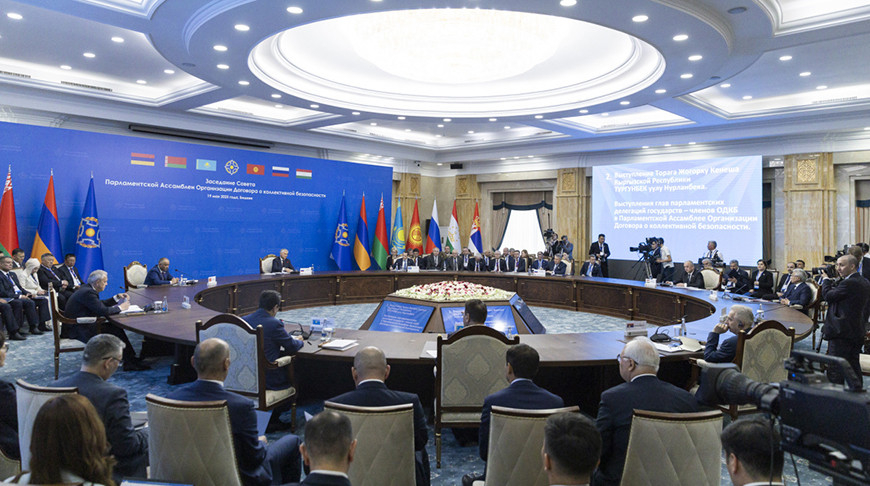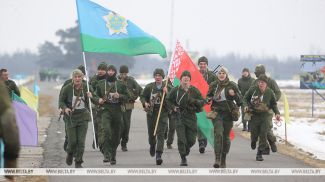
MOSCOW, 19 May (BelTA) – Plans are in place to sign a roadmap for the development of cooperation between the CSTO, CIS and SCO by the end of this year, CSTO Secretary General Imangali Tasmagambetov said at a meeting of the Council of the CSTO Parliamentary Assembly in Bishkek on 19 May, the CSTO press service told BelTA.
"The draft roadmap on the development of cooperation between the CSTO, CIS and SCO has been prepared by the CSTO Secretariat and preliminary agreed upon during the consultations held on 17 February at the level of deputy secretaries general of the CSTO, CIS, SCO. It is now being reviewed by the CIS and SCO member states. We are planning to sign it by the end of this year," Imangali Tasmagambetov said.
"Strengthening regional security and stability in Eurasia is inextricably linked to the further development of the trilateral format of cooperation between the CSTO, the CIS and the SCO. We believe that these three organizations, which are close in spirit and in political priorities, can jointly set the tone for efforts to create a new continental security architecture, align the integration projects and harmonize relations between development centers in Eurasia," the CSTO chief said.
In addition to the CIS and the SCO, Imangali Tasmagambetov named the UN among the international organizations, interaction with which is important for the CSTO. "Objectively, the interests of the CSTO and the UN in maintaining peace and security coincide. We will consistently develop cooperation, first of all, in the areas of peacekeeping, combating terrorism and drug trafficking, and also countering threats in international information security," he emphasized.
"Generally we are satisfied with our interaction with the United Nations Office of Counter-Terrorism and the executive director of the UN Security Council Counter-Terrorism Committee, the UN Office on Drugs and Crime under the existing memoranda. We are interested in further expanding this cooperation. We have effective practical experience; over the years we have developed the methods of cooperation to deprive international terrorist organizations of a breeding ground. They are implemented mainly on the basis of planned operational and preventive measures carried out by the competent authorities of CSTO member states such as operations ‘Channel’, ‘PROXY’, ‘Illegal’ and ‘Mercenary’. Their goal is to systematically counter illegal drug trafficking, suppress illegal migration and prevent the use of information and communication technologies in the interests of the international terrorist organizations and to block the channels of recruitment and entry/exit of citizens of our states to participate in terrorist activities and neutralize the resource base of terrorist organizations," Imangali Tasmagambetov said.
"The draft roadmap on the development of cooperation between the CSTO, CIS and SCO has been prepared by the CSTO Secretariat and preliminary agreed upon during the consultations held on 17 February at the level of deputy secretaries general of the CSTO, CIS, SCO. It is now being reviewed by the CIS and SCO member states. We are planning to sign it by the end of this year," Imangali Tasmagambetov said.
"Strengthening regional security and stability in Eurasia is inextricably linked to the further development of the trilateral format of cooperation between the CSTO, the CIS and the SCO. We believe that these three organizations, which are close in spirit and in political priorities, can jointly set the tone for efforts to create a new continental security architecture, align the integration projects and harmonize relations between development centers in Eurasia," the CSTO chief said.
In addition to the CIS and the SCO, Imangali Tasmagambetov named the UN among the international organizations, interaction with which is important for the CSTO. "Objectively, the interests of the CSTO and the UN in maintaining peace and security coincide. We will consistently develop cooperation, first of all, in the areas of peacekeeping, combating terrorism and drug trafficking, and also countering threats in international information security," he emphasized.
"Generally we are satisfied with our interaction with the United Nations Office of Counter-Terrorism and the executive director of the UN Security Council Counter-Terrorism Committee, the UN Office on Drugs and Crime under the existing memoranda. We are interested in further expanding this cooperation. We have effective practical experience; over the years we have developed the methods of cooperation to deprive international terrorist organizations of a breeding ground. They are implemented mainly on the basis of planned operational and preventive measures carried out by the competent authorities of CSTO member states such as operations ‘Channel’, ‘PROXY’, ‘Illegal’ and ‘Mercenary’. Their goal is to systematically counter illegal drug trafficking, suppress illegal migration and prevent the use of information and communication technologies in the interests of the international terrorist organizations and to block the channels of recruitment and entry/exit of citizens of our states to participate in terrorist activities and neutralize the resource base of terrorist organizations," Imangali Tasmagambetov said.













